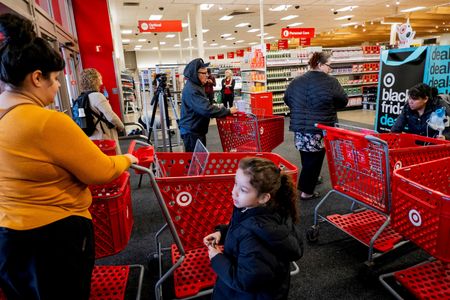NEW YORK (Reuters) – U.S. online spending is experiencing a rebound, spurred by high gas prices, convenient delivery options and a surge in deals following a brief post-pandemic slump, U.S. retailers say.
Americans, who embraced shopping online when many stores were closed or limited traffic, may be coming back to it now, retailers say. However, the sustainability of these recent gains will depend on whether gas prices remain high and if shoppers can continue paying for subscriptions that offer free delivery.
E-commerce sales made up 15.9% of total U.S. retail sales in the first quarter, the highest since they peaked at 16.4% during the height of the pandemic in 2020’s second quarter, according to Department of Commerce data.
Target said its online sales returned to growth in the first quarter ended May 4 after more than a year of declines. It cited more products available online and the popularity of same-day delivery.
Bigger rival Walmart reported a 22% surge in U.S. online sales last week, exceeding the 17% growth it recorded during the typically strong holiday season.
Lowe’s said its expanded same-day delivery partnerships with DoorDash and Shipt helped it grow online sales and offset some of the slowdown it was seeing with big-ticket projects.
Gas prices are also dissuading Americans from driving to stores, according to Cox Automotive.
Target said store-originated comparable sales fell 4.8% in its first quarter, while those originated online rose 1.4%.
Walmart said consumers of all income levels are prioritizing price, but especially low-income shoppers. Higher-income shoppers are gravitating to Walmart.com for the wider array of merchandise it now offers through its third-party marketplace.
Delivery was a big draw, with those services availed at a higher rate than pickup in store, Walmart said. Target, by contrast, saw more of its shoppers use curbside pickup. Its ‘Drive Up’ offering generated over $2 billion in sales in the first quarter.
U.S. retailers invested heavily in online businesses during the pandemic, offering perks like streaming subscriptions, discounts on fuel and multiple delivery options.
Walmart offers unlimited free deliveries for $98 per year under its Walmart+ subscription. Target launched Target Circle 360 in April, offering unlimited same-day deliveries for $99 a year if subscribers meet a $35 basket minimum.
To be sure, some of the sales gains in the quarter were driven by spring sales events Walmart and Target launched to rival Amazon’s first ever “Big Spring Sale” in March.
Still, consumers spent $331.6 billion online from Jan. 1 to Apr. 30, 2024, up 7% from a year ago, looking for cheaper groceries, personal care, electronics, apparel and furniture, Adobe said in a report this month.
Brian Jacobsen, the chief economist at Annex Wealth Management, suggested that Target’s digital sales growth might be attributed to their heavy promotion of the Target360 service with free trials. The company offered the service for $49 per year for a few months besides a 14-day free-trial option.
“The key is to convert the free trials into actual paying subscriptions,” he said.
Walmart attributed some of its online sales growth to a 45% increase in the number of rollback deals on food and grocery products it offered in April compared to the same period last year.
(Reporting by Siddharth Cavale in New York; Editing by Nick Zieminski)





